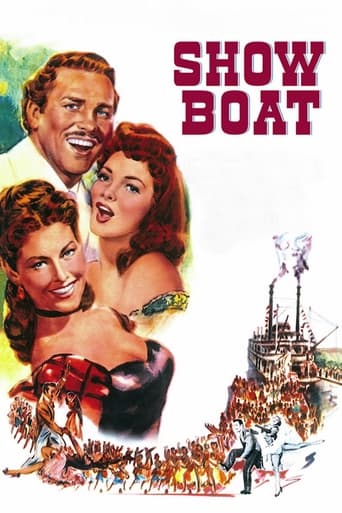Jackson Booth-Millard
I had heard about this film maybe once or twice, I knew it was musical, but that's about it, I was looking forward to a colourful film with recognisable songs, based on the stage musical by Jerome Kern and Oscar Hammerstein II (of Rodgers and Hammerstein), directed by George Sidney (Anchors Aweigh, Annie Get You Gun, Kiss Me Kate). Basically show boat the "Cotton Blossom", owned by Cap'n Andy Hawks (Some Like It Hot's Joe E. Brown), arrives in a Mississippi town for a performance. Its leading man Steve Baker (Robert Sterling) has a fistfight with boat engineer Pete (Leif Erickson), as he was making passes at Steve's wife, leading lady Julie La Verne (Ava Gardner). Cap'n Andy pretends to the gathered crowd that the fight was a preview for a melodrama performance, but Pete goes to the police to report a dark secret about Julie. Riverboat gambler Gaylord Ravenal (Howard Keel) has gambled away a boat ticket, so he boards the Cotton Blossom pretending to be an actor, but he is rejected a passage, however he and the captain's daughter Magnolia (Kathryn Grayson) meet, they are instantly smitten with each other. That night, during a vaudeville performance on the show boat, Pete shows up with Sheriff Ike Vallon (Regis Toomey), Julie, a black woman is married to a Steve, a white man, this is illegal, Julie admits that she is half-black, and Steve convinces the sheriff he is also half- black, Pete is fired by Cap'n Andy, but Julie and Steve are also forced to leave. Magnolia tearfully says goodbye to Julie, her best friend, she and Steve leave the company, Cap'n Andy takes on Ravenal who offers to help, he becomes the new leading man, and Magnolia becomes the new leading lady, despite the strong objections of Cap'n Andy's wife Parthy (Agnes Moorehead), also Magnolia's mother. Within a few weeks, Magnolia and Ravenal become a hit on the river, and have fallen in love, they become engaged and are married, moving to Chicago, living off Ravenal's gambling winnings. A year later, Ravenal loses all his money gambling, when he becomes broke Magnolia tells him off for his obsession for gambling, feeling guilty after Magnolia's outburst, Ravenal walks out on her. The dance team on the show boat, Ellie May Shipley (Marge Champion) and Frank Schultz (Gower Champion), suddenly show up in Chicago, they take Magnolia to nightclub the Trocadero to audition, but the club already has a singer, it is Julie, who has become a hopeless alcoholic since Steve left her. Julie overhears Magnolia's audition from her dressing room, she learns that Ravenal has deserted her, Julie quits to make sure Magnolia will be hired, Cap'n Andy arrives and watched Magnolia's debut, and gives her support when she experiences stage fright. Magnolia tells her what happened with Ravenal, and reveals that she is pregnant with Ravenal's child, she did not tell Ravenal due to their financial situation, she returns to the show boat with Cap'n Andy, where she gives birth to a daughter, Kim. Five years pass, Ravenal is gambling on a packet boat, he finds a drunken Julie trying to sing, he punches her escort for slapping her, she finds out Magnolia is married to Ravenal, but she did not realise he knew nothing about Magnolia's pregnancy, she tells him off. Ravenal overcome with guilt returns to the show boat, there he meets his little daughter Kim (Sheila Clark) for the first time, he and Magnolia reconcile, stevedore Joe (William Warfield) sings as the boat prepares to leave, Cap'n Andy and Parthy embrace, and Julie emerges on the dock to blow Magnolia a kiss as the ship sails away. Also starring Adele Jergens as Cameo McQueen and Leif Erickson as Pete. Gardner gives a good performance as the downtrodden singer, Keel is a good charmer with a great voice, and Grayson has a fantastic voice and looks pretty, it is a simply enough story about show business and love, many of the songs work well, the best is definitely "Ol' Man River", the dance sequences have superb choreography, and the use of colour for the costumes and scenery is magnificent, overall it is an enjoyable musical. It was nominated the Oscar for Best Cinematography and Best Music for Adolph Deutsch and Conrad Salinger. Very good!
Michael Scarlotti
And my all-time favorite.First off: I have seen the 1936 version three times. It's great ... but it doesn't begin to match the magical 1951 remake. The '51 version is simply perfect in every way: visually, musically, acting, directing, editing ... you name it.In many ways, it plays like the greatest of the silent films, in that the drama is conveyed almost entirely through the facial expressions of the actors (especially during the many musical numbers). There are few dramatic speeches in this film, and it it packs a far greater emotional wallop because of it. This also serves to enhance the power of the dramatic dialogs when they do occur (Julie's confrontation with Gaylord). It's cinema distilled to its purest and most visceral form.I've enjoyed reading how several scenes were cut to pick up the pacing (the old woman's speech that serves as a catalyst to Nolie & Gay's reconciliation). When they suddenly rush together and embrace *without any explanations or apologies* the effect is emotionally overwhelming. It's got all the grand, sweeping passion that one could wish for in an ideal love affair, which theirs (in spite of their troubles) is. No further words are passed between them. Captain Andy & Parthy comment on it ("It's Saturday night again!"), as they board The Cotton Blossom in one another's arms. Julie's silent appearance in the final shot is both uplifting and heartbreaking. It's got to be one of most memorable images in motion picture history. I've seen this film at least a dozen times over the past 40 years, and have never been able to make it through the finale with dry eyes.By contrast, the ending of the 1936 version is far less emotionally satisfying. In that version, Julie is long gone from the story, and Nolie and Gay have grown old in the 20 years or so they've been apart. Even their "reconciliation" feels iffy (Gay has joined Nolie in her theater box to watch Kim perform, but after so many years apart, one doubts that things will progress any further).
calvinnme
This is a great splashy color musical in the MGM tradition. If that is what you are looking for then look no further. If you are looking for a story that more closely follows the dramatic line of Edna Ferber's novel you want to watch the 1936 version. Edna Ferber's heroines usually had some weakness or problem that they tried to solve by leaning upon a man. Ferber would remove the crutch (the man) from the heroine's life and, only once the woman had grown strong as a person, would she be reunited with the man upon which she had once leaned... or not. That was true in the novel Showboat, but not here. In this film Magnolia is only separated from her gambling husband Gaylord for a very few years before he returns. They both still have their youth and their daughter is quite young and almost everyone has a MGM happy ending. And the biggest surprise - Magnolia's mom turns out to have a heart of gold when, in the novel, her ill temper and constant sniping at first aimed at Magnolia's father and then at her husband, helped precipitate many problems in the first place. To eliminate any talk of controversy and keep this a big happy musical Lena Horne did not get the part of tragic figure Julie. Instead that part went to Ava Gardner.If you are going to do a musical in the 1950's Howard Keel has a strong wonderful voice and strikes a powerful pose, but that is exactly why he is totally wrong for the part of Gaylord Ravenal. I could believe in the 1936 version when Allan Jones slinks off and leaves Magnolia - he seemed like a credible rat. Not so Howard Keel. He looks every inch a gentleman and does not seem like a coward and a quitter at all, not even if he is practically pushed away.I'm giving this six stars because it is a cinematically beautiful film with a talented cast performing great musical numbers. Just don't expect the hard edges of the 1936 version.





